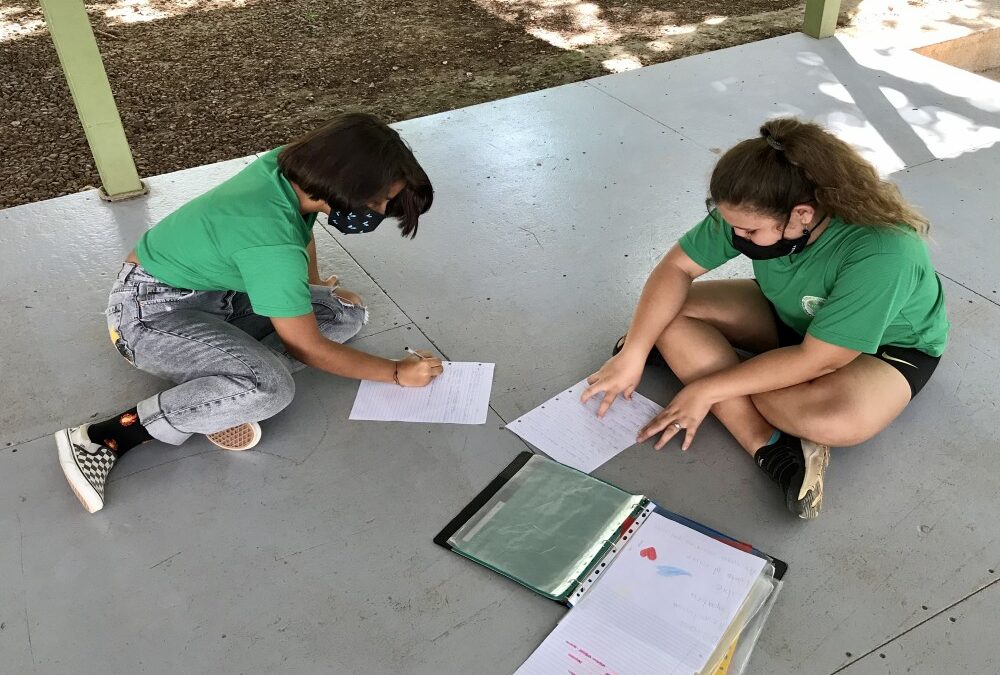
by Angie Briceño | Mar 4, 2021
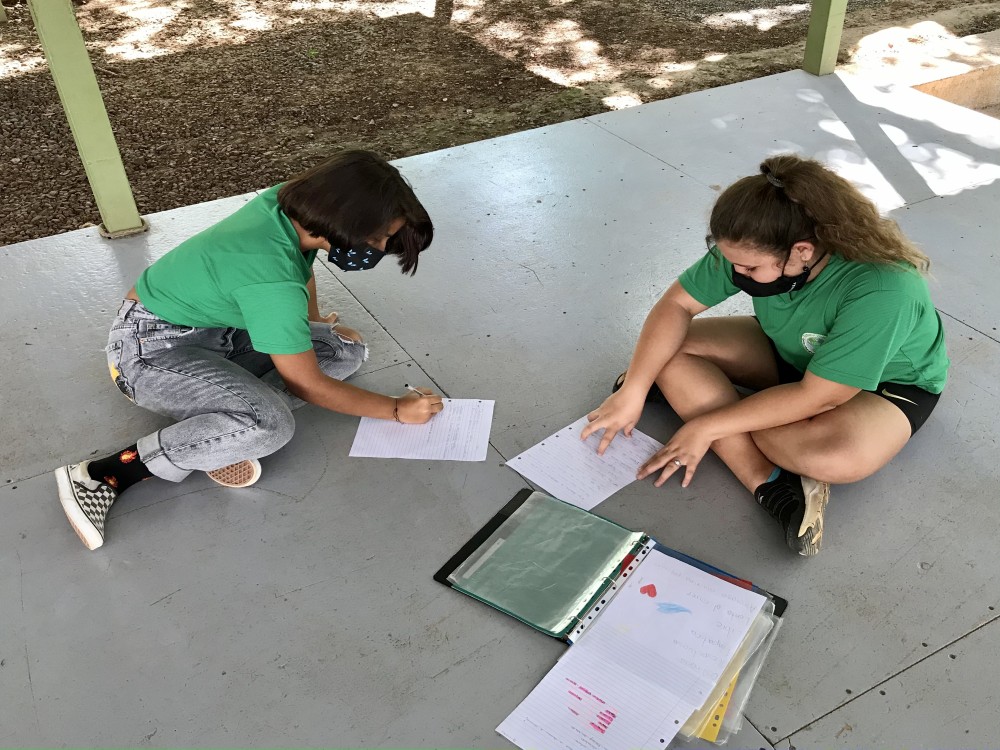
The time is approaching when teachers send home mid-semester reports. Mid-semester reports are just as important as end-of-semester grades, if not more important, because the purpose of these reports is to inform families about their child’s academic and class progress during the first semester.
The mid-semester reports for elementary and junior high school grades come with specific sections related to the student’s academic performance in the different areas in the different subjects they are studying.
This year there is going to be a major change in students’ mid-semester reports, as the report recognizes and endorses the different areas of the student:
- Attitude: Has a positive and respectful attitude towards peers and teachers.
- Delivery: Complies with the delivery of assignments and activities performed in class.
- Skills: Develops the skills and acquires the knowledge expected in the class activities or assignments.
- Effort: Demonstrates your best effort.
Sending the reports is an excellent time to talk to your child and also, do not hesitate to contact the teachers if you have any questions.

by Javier Sánchez Cáceres | Mar 4, 2021

World Water Day
World Water Day is celebrated on March 22 to reflect on the importance of this natural resource that allows us to live. We are very fortunate to live in an area where there is water everywhere and we do not have to travel to get drinking water. In spite of this, there is a lack of awareness about the proper use of this natural resource. That is why the celebration of World Water Day is extremely important, as it allows us to remember how urgent it is to use water responsibly and to be grateful for its abundance.
Possibly the misuse of water results from ignorance, as few have any idea that more than 2 million people do not have access to safe water or have to ration their use on a daily basis due to the threat of drought. During the COVID-19 pandemic we have reinforced the importance of water as hand washing is essential to control the spread of the virus. This reinforces the need to make proper use of the resource so that it remains available now and in the future.
As part of the celebration World Water Celebration and with the interest of providing information about water management in Montezuma, we present to you an interview with Donatella Luxardo, president of the ASADA of Montezuma, who was kind enough to answer questions generated by the students about the ASADA and its operation. Below are the questions that were asked to Donatella:
What is the ASADA?
The Asociaciones Administradoras de Sistemas de Acueductos y Alcantarillados Sanitarios (ASADAS) is the administrative body of communal aqueducts and sewers. The ASADAS operate as non-profit organizations, have five members, a fiscal, which are volunteer members who are elected by the community in assembly. It is worth mentioning that the ASADAS are regulated by the Ministry of Aqueducts and Sewers (AyA), the national water resource administration entity.
How many ASADAS are there in Cóbano?
The aqueduct of Cobano, Santa Teresa and Mal Pais is administered directly by AyA. In the other towns there is an association that manages the aqueduct, for example ASADA Montezuma, ASADA El Molino de Delicias and ASADA San Isidro. Currently the ASADA of Montezuma and Delicias have agreements established with AyA.
How many users does the Montezuma ASADA have?
Currently the ASADA has 310 users.
How much is the average monthly consumption of the users?
The consumption per user depends on the area of usufruct. The central area of the town is where there is more consumption, mainly due to the number of hotels and restaurants located in the area. In residential areas consumption is normally less than 30 m3.
What are ASADA’s plans for the short and long term?
In the next few months we will be working on the connection of two new wells to supply certain densely populated neighborhoods. In the long term we intend to start building a sanitary sewer system from the Montezuma School to Las Palmeras Beach.
Stay tuned for the second part of this interview, which we will transmit through a conversation on Zoom, in which we will discuss the origin of our water, how to use water responsibly, and how to save water consumption, among other topics.
Thank you very much for reading us and remember that water runs out drop by drop.


by Claudia Liliana Piñeros Henao | Feb 21, 2021
Celebrated on 21 February
Preserving the Language Diversity

Languages are of vital importance for people and the world. Unfortunately, due to the growth of globalization , they are increasingly under threat of disappearing altogether. When languages vanish, so does the world´s cultural diversity. Traditions, opportunities, memories, unique manners of expression and thinking will sadly also disappear.
According to the United Nations, at least 43% of the estimated 6000 languages spoken in the world are endangered. “Only a few hundred languages have genuinely been given a place in education systems and the public domain, and less than a hundred are used in the digital world”.
International Mother Language Day has been taking place every year since February 2000 to promote linguistic and cultural diversity and multilingualism.
Everybody should always be aware that languages are the most powerful instruments of preserving and developing our cultural heritage. We must encourage our children to cherish their mother tongue as it is a precious treasure, and It also helps them appreciate their personal, social, and cultural identity.
On the other hand, when our children develop strong communication skills in their mother language, they could have stronger literacy skills in other languages.
“Multilingual and multicultural societies exist through their languages which transmit and sustainably preserve traditional knowledge and cultures.” ( UN)

by Noelia | Jan 29, 2021
This year Futuro Verde will be conducting school tours a bit differently than in the past. Due to Health Ministry protocols, in person tours of the school by prospective families are not permitted. However, you can still schedule a virtual tour and information session! During the virtual tour, I will happily answer questions regarding school logistics, curriculum, extracurriculars, health protocols, and more. Virtual tours can be scheduled on Thursday mornings or afternoons. Please see the table below to review available time slots. We encourage interested families to contact us now and book your virtual tour!

To book your virtual tour, please contact Jennifer Middleton, jenni@futuro-verde.org.
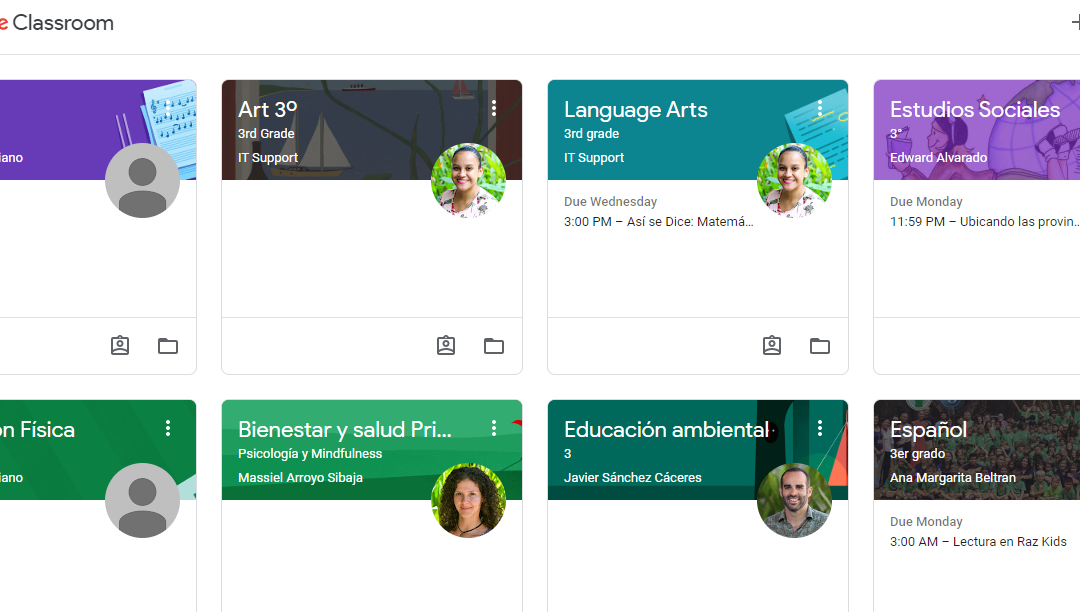
by Lural Ramirez | May 6, 2020
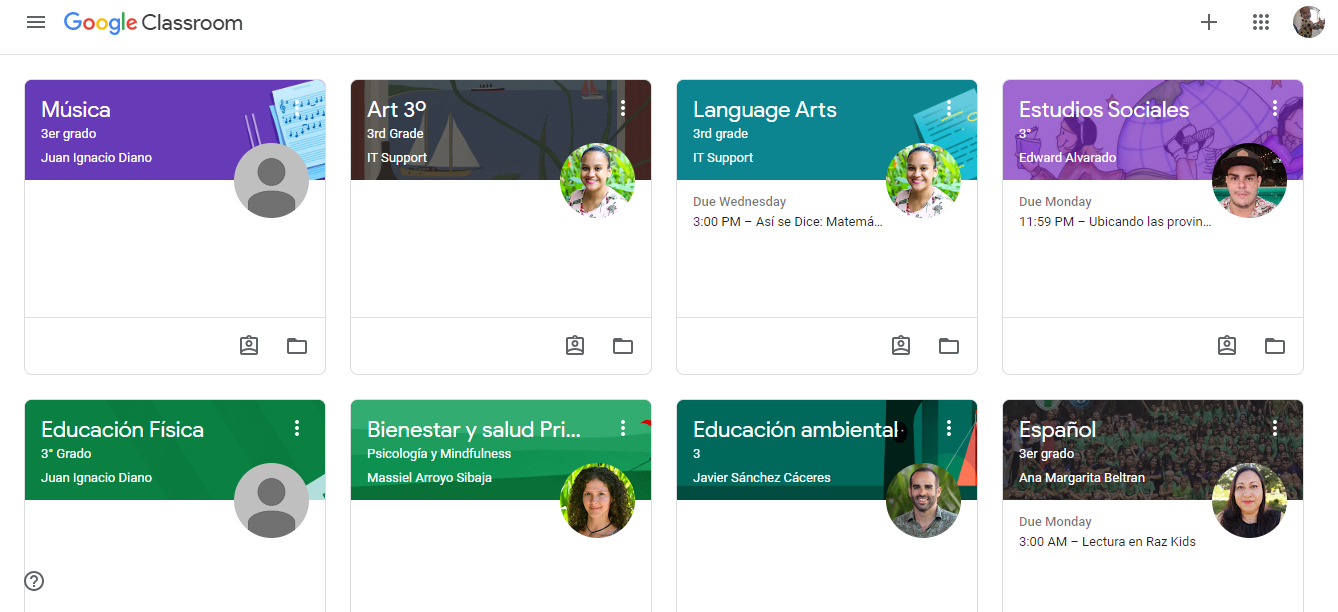
As schools around the world transitioned to distance learning models in response to the novel Coronavirus pandemic, there have been milestones and moments that have been key, and as reported by the World Economic Forum on April 22, 2020, we have seen unprecedented global cooperation in response to the suffering and social-distancing efforts.
As the virus made its way to Latin America, Futuro Verde was weeks, and in some aspects years, ahead in our preparation for this required shift to online learning. The timeline below details our school’s response to this crisis and our preparedness efforts.
2014, over a period of months
Futuro Verde webmaster Khalida Lockheed spearheaded our application to Google to become a “Google For Education” school. Our application was accepted, giving us free, unlimited access to domain-specific @futuro-verde.org emails, Google For Education Apps like Gmail, Classroom, and the like. This step allowed all Futuro Verde board members, staff and students to have Futuro Verde emails and a controlled and safe shared domain for our IT needs.
How did this help us during the pandemic? All staff and students were already united under a common domain, which facilitated both more complex and collaborative online processes as well as an assurance that email server filters follow our students’ safeguarding protocols and policies.
2015, over a period of months
Futuro Verde webmaster Khalida Lockheed, in her dual role as webmaster and design manager, shifted our www.futuro-verde.org website to a content management system (WordPress), allowing for greater flexibility and collaboration.
How did this help us during the pandemic? Having the ability to quickly and easily link students and families to all of our online learning tools and resources aided in a smooth transition into a full online learning mode.
2016 school year
Secondary teachers began implementing the Google for Education Classroom app with more consistency starting in 2016. Students in upper secondary grades had become accustomed to having a parallel online platform which was initially used to document assignments and projects and to digitally receive student work for projects assigned.
This year as well, some preschool and primary teachers began to experiment with the Seesaw Platform, used then as a supplemental family communication tool.
How did this help us during the pandemic? As we shifted to online learning, Classroom and Seesaw became our main platforms for student online, at-home engagement and work. Our previous experience with both platforms made this new leap to larger use volume much more manageable and smooth.
2017-2019 school years
As Futuro Verde grew, we were able to acquire much needed, full-time support in IT and we began to purchase and systematically use several key databases, tools and programs that support student learning. Specifically, we acquired: Turnitin, a similarity detection tool to help students learn how not to plagiarize their work; EBSCO a database of reliable sources for information across a myriad of subjects and grade levels; Reading A to Z, a platform that provides independent level reading support for our pre-k and primary students; and IXL, a license we purchased for school-wide use to reinforce our students’ math abilities through an online platform personalized to their current needs and abilities and updated continually to meet their needs.
Additionally, from an administrative perspective, we purchased a school Zooom pro account in order to facilitate the confirmation of strategic university, governmental and private partnerships to benefit our students. And, perhaps most importantly, in 2019 we became a PTC member school.
How did this help us during the pandemic? Futuro Verde’s databases, tools and programs have been pillars in our instructional focus during online learning, shifting from the supplemental structures they once were to more integral and central tools for learning during our online program. Zoom Pro has allowed us to continue to effectively coordinate as staff and to maintain that high level of care and personalized attention our teachers and school are known for.
Via the listservs established by the PTC as a part of our membership status, PTC membership has meant that we have been kept at the forefront of the response by reputable international schools around the world. Furthermore, as I mentioned at the start of this article and as the World Economic Forum has confirmed, the unprecedented global cooperation between international and government schools has been invaluable to us at Futuro Verde. Our leadership team and governing body began receiving advice and updates from partner schools in China, then the rest of Asia, then the Middle East, Europe, Africa and now Latin and North America as the virus spread across the globe. The virus came to our continent last and we have benefited greatly from the lessons learned by our partner schools and we have modified resources eagerly shared with us by other schools who are weeks ahead of us in their response in order to best meet the needs of our unique student population. And please know that we have extended that same level of support in return, sharing our own best practice with other schools in the hopes that it might help them better weather this storm we are all in together.
This doesn’t mean we were perfectly prepared for everything though…
In the one day we took for teacher training on March 17th before immediately moving to online learning with students, we hurriedly got up to speed on Google Hangouts, for daily student check-in and accessibility for office hours with teachers throughout the day. We had always had access to this App as a part of our “Google For Education” status, but our first real use of the app coincided with the crisis. Luckily our amazing teachers are dedicated learners themselves and so they dove into this new challenge, and the others that have come, as we continue to innovate our approach and program as the weeks go by.
I sincerely hope this look back in time related to preparedness has helped further contextualize the value of investing in a high quality education for your child. Effective, coordinated efforts require time, in this case years, and they also require vision, commitment and determination. As Head of School, I am deeply appreciative for our fantastic staff who have contributed to our readiness for online learning, to our international school partners for their generosity and time, and, most importantly to our students and their families for their commitment to progressive, high-quality and future minded education on the Nicoya peninsula!
For more information on our specific programming, please visit our website which houses specific information and resources related to our online and distance learning program. And, stay tuned for new response to the crisis yet to come! The latest updates from our partner schools outside of Latin and North America is that most countries and schools are beginning to transition back to on-campus learning, with modifications and precautions new to all. So, if the pattern of this global crisis stays true, a whole new challenge awaits our community soon when Latin and North America also begin to transition back! If you know us well, you know we have been preparing for that for weeks now already…
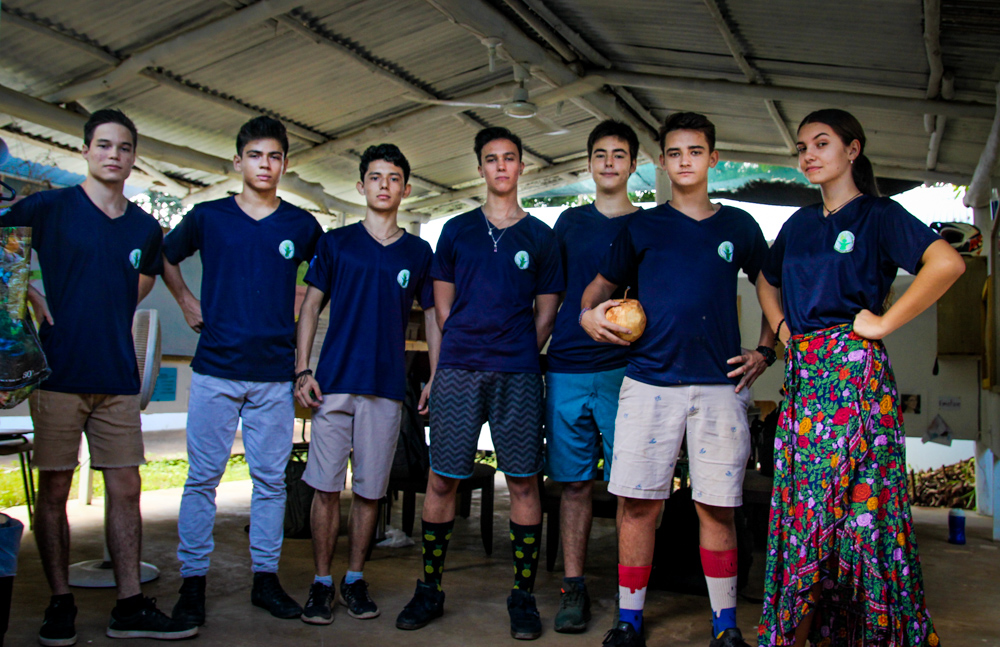
by Angie Briceño | May 5, 2020

We all remember our last year of high school: a moment in each of our lives full of all kinds of different emotions like stress, anxiety, excitement, and happiness. High school seniors experience many feelings and emotions. That last year is a culmination of a stage in life, the line between starting to live an adult life and leaving behind the life of a teenager and high schooler. That is why it is such an important time in life to have unique experiences and create lifelong memories.
High school seniors around the world are living in a unique moment in history, and our seniors are no exception. This pandemic has completely changed their senior year in terms of tests, deadlines, and the uncertainty of what will happen next. Aside from academics, they are also experiencing a social change in their senior year with their friends, eating together, doing activities that would leave a lasting impact on their lives and on the school as well. Have you imagined what it would be like to be a high school senior right now?
Here is what 12th graders Alejandro Mora and Maya Reolon have to say about their experiences during the pandemic:
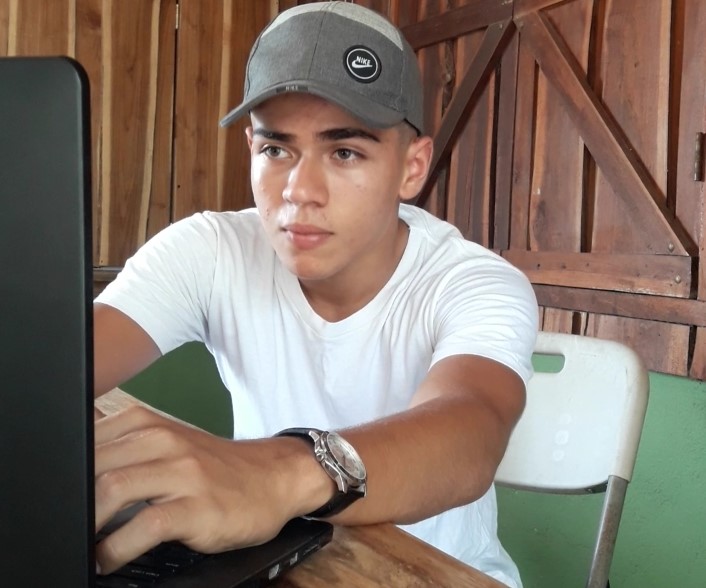 “For me the transition to online learning has been very difficult. It’s hard for me to stay motivated and concentrate on my work. I started doing schoolwork from home, but there were so many distractions like the TV, cell phone, etc. Things got easier once I had a good Internet connection, because I was able to contact my teachers more, and get my questions answered, but I still find online classes to be more difficult than in-person ones. What I miss most from being at school is socializing. I miss seeing my classmates every day. One good thing about this situation is that I can develop more self-discipline, which I have made an effort to do. I try to take more responsibility for myself and my things, and without counting on anyone to constantly supervise me, I can be more independent.”
“For me the transition to online learning has been very difficult. It’s hard for me to stay motivated and concentrate on my work. I started doing schoolwork from home, but there were so many distractions like the TV, cell phone, etc. Things got easier once I had a good Internet connection, because I was able to contact my teachers more, and get my questions answered, but I still find online classes to be more difficult than in-person ones. What I miss most from being at school is socializing. I miss seeing my classmates every day. One good thing about this situation is that I can develop more self-discipline, which I have made an effort to do. I try to take more responsibility for myself and my things, and without counting on anyone to constantly supervise me, I can be more independent.”
– Alejandro Mora 12°
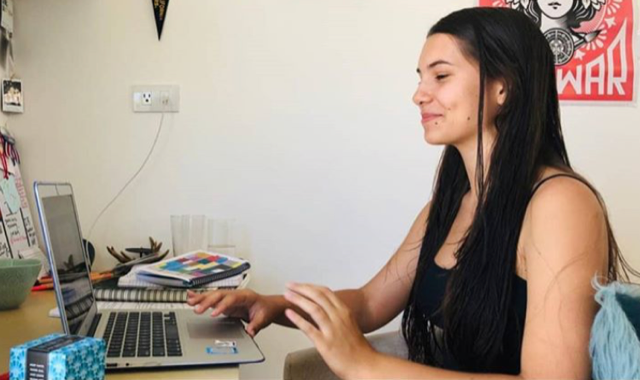
Life as a student, particularly as an IB senior, has been interesting during the COVID-19 pandemic. Us students, as well as teachers, are learning how to continue our academic lives by virtual means. Classes are now directed by Zoom meetings, presentations are now shared by videos, and so forth. This is all not as one would expect their educational year to be, but so far, it has gone well! When online learning began, all of us students in IB were worried if we would not have the motivation to continue our learning at home. Well, so far it has been over a month, and we have been working harder than ever. I am so proud of my IB peers and for the rest of the students, keeping the motivation up and working very hard during times like this. I am also very proud of the teachers, who are working very hard (if not harder) during this time of online learning. Personally, so far this year has been a learning curve. I am learning not only academic material, but I am learning patience and I am learning self-discipline. The teachers have been very supportive with us students, especially in IB. I am thankful for them, and I am thankful for my peers. I know that when school comes back, everybody will feel more at ease and happy to be in a classroom! Even though we are all physically apart, we are all united. Thank you Futuro Verde! Go class of 2020!











 “For me the transition to online learning has been very difficult. It’s hard for me to stay motivated and concentrate on my work. I started doing schoolwork from home, but there were so many distractions like the TV, cell phone, etc. Things got easier once I had a good Internet connection, because I was able to contact my teachers more, and get my questions answered, but I still find online classes to be more difficult than in-person ones. What I miss most from being at school is socializing. I miss seeing my classmates every day. One good thing about this situation is that I can develop more self-discipline, which I have made an effort to do. I try to take more responsibility for myself and my things, and without counting on anyone to constantly supervise me, I can be more independent.”
“For me the transition to online learning has been very difficult. It’s hard for me to stay motivated and concentrate on my work. I started doing schoolwork from home, but there were so many distractions like the TV, cell phone, etc. Things got easier once I had a good Internet connection, because I was able to contact my teachers more, and get my questions answered, but I still find online classes to be more difficult than in-person ones. What I miss most from being at school is socializing. I miss seeing my classmates every day. One good thing about this situation is that I can develop more self-discipline, which I have made an effort to do. I try to take more responsibility for myself and my things, and without counting on anyone to constantly supervise me, I can be more independent.”